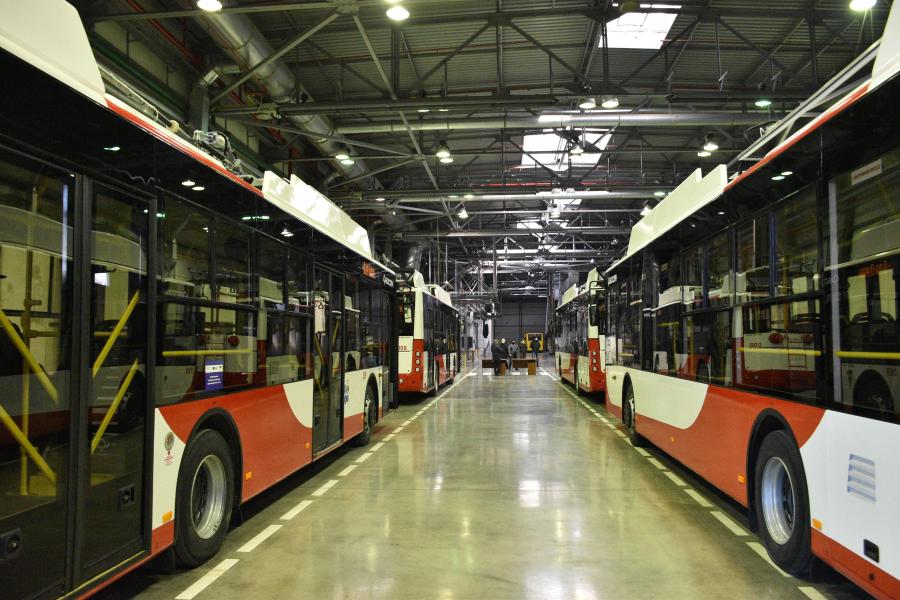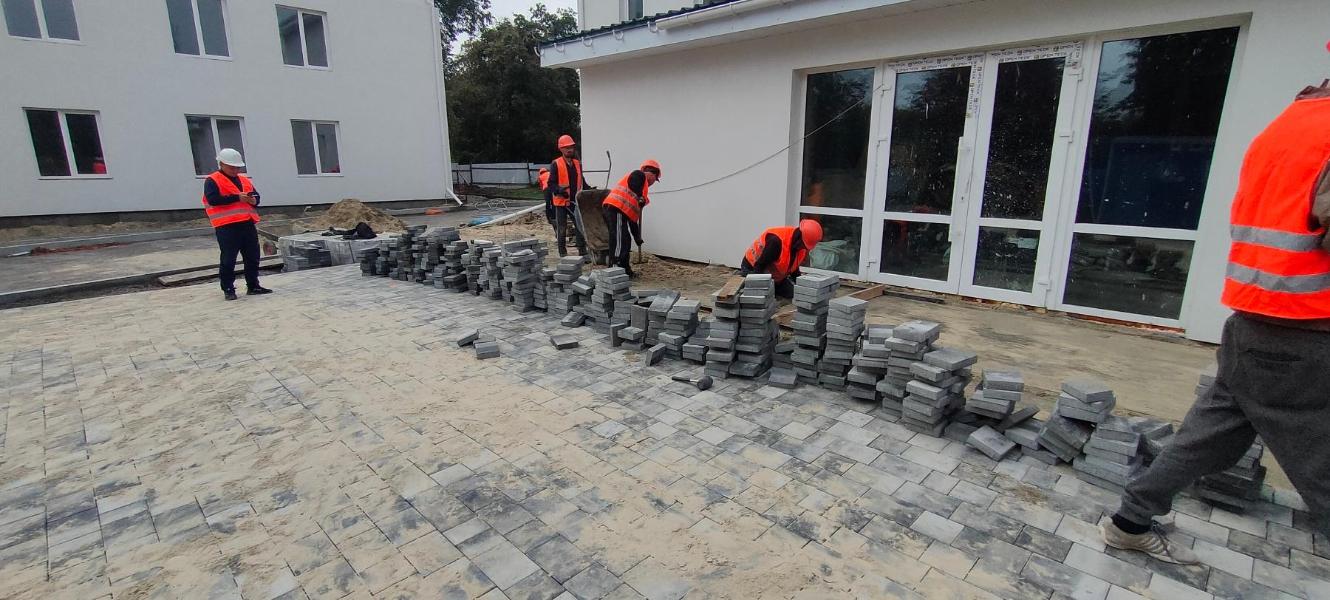The EU bank backs hundreds of projects essential to Ukrainian people’s lives during war
When Violaine Silvestro von Kameke explains that her main job involves investing in dozens of cities in Ukraine during the war, people are surprised, to say the least. “People think the war has stopped our activity in Ukraine,” says the senior loan officer at the European Investment Bank. “But we are disbursing a lot of money in Ukraine and working on many complex projects there. We are very active.”
The European Investment Bank relocated its employees from Ukraine after the Russian invasion in February 2022. But at the same time it dramatically increased its assistance to the country. It has stepped up its work with ministries, cities and UN experts on the ground. This work is vital, because the Ukrainian government says it needs about €765 billion over the next 10 years to recover from the Russian invasion.
The European Investment Bank approved two major funding packages for Ukraine during the war. A first package of €668 million shortly after the war began helped the government pay for urgent needs. A second package of €1.59 billion, signed in July 2022, was used to repair damaged infrastructure and resume critical projects. A little more than €1 billion from this second package has been disbursed to help the country repair damaged roads, bridges and railways.
Other EIB assistance in 2022:
- The EIB Institute, the EU bank’s social and cultural arm, offered €2.5 million in humanitarian help to Ukrainians affected by the war.
- €59 million in grants were repurposed to repair trains and railways in Ukraine, install temporary replacement bridges, and improve healthcare and housing for people forced to flee their homes.
- In November, the Bank signed a memorandum with Ukraine calling for more investment in the capital of Kyiv’s transport system and recognizing the urgent need for more than €450 million to modernise the metro.
- Nearly €18 million in grants from the Eastern Partnership Technical Assistance Trust Fund are helping communities care for about 700,000 people who fled their homes. This fund is backed by Austria, France, Germany, Latvia, Lithuania, Poland, Sweden and the United Kingdom.

EIB financing helped bring new buses to Lutsk in northwestern Ukraine.
Supporting projects away from conflict areas
“We can’t launch big, national projects right now, so our help is focused on small projects and helping people live during these hard times,” says Hervé Guenassia, another senior European Investment Bank loan officer working on Ukrainian projects. “If we did a big project, such as repairing an airport, we are sure Russia would destroy it.”
The European Investment Bank has been working in Ukraine for 15 years, financing more than €8 billion in projects. In 2014, after Russia occupied eastern Ukraine and annexed Crimea, we approved a €200 million early recovery “framework loan” to assist people who fled the conflict and the towns that accepted large numbers of refugees. This type of loan can be used to help almost any public project essential for daily life—heating systems, schools, hospitals, sports centres. Some of these projects have now been destroyed by the war, including one of the highlights of our recovery programme, a state-of-the art library and technology centre in Mariupol
“It is very sad to see so many of these projects destroyed, because this work brought so much hope to the local people,” says Roy Draycott, a civil engineer at the European Investment Bank who worked in the Kyiv office for six years. Draycott plans to return to live and work in the country as soon as the war is over.
- Discover how an EU engineer helped rebuild Ukraine over the past half a decade.
- Half of the world’s poor populations live in countries that have high poverty levels or conflicts. Find out how to break this cycle.
Daily conversations with mayors during war
Even during the worst parts of the current war, in areas experiencing the most conflict, Guenassia and Silvestro von Kameke continued to get calls from mayors asking for technical advice and financial assistance. In August and September 2022, the European Investment Bank held a “call for proposals” to finance projects in Ukraine and received about 1 000 applications from cities and private companies. The EU bank plans to approve more than 300 of these requests and hold more calls for project proposals at the end of 2022 and beginning of 2023.
Financing projects approved in 2022 to help Ukraine include:
- New tram cars in Kyiv and Lviv
- New buses for Lutsk
- Repairs to healthcare facilities in Odessa
- Renovation of damaged educational buildings in Myrgorod and Shyshaky
- Major rebuilding of a foreign-language school in Kamyanske
- Reconstruction of a youth arts centre in Zaporizhzhia
- Repairs to a sport and rehabilitation complex in Reshetylivka
- Rebuilding a nursery school in Brovary
We are also helping Ukraine rebuild or repair logistics centres, deliver blankets, thermal mugs and rucksacks to people hiding in bomb shelters, build housing for people who had to move because of the war, improve firefighting and ambulance services, fix broken electricity and gas lines.
Keeping Ukraine’s electricity and gas supplies running involves more than just repairing damage. The country’s utility companies are in trouble during the war as their expenses rise and their revenue plummets, because millions of people can’t pay their energy bills. “There is an energy crisis in the country,” Guenassia says. “We are spending a lot of time talking to energy companies to find ways to help them stay liquid and keep supplying energy.”

EIB loan officers helped the city of Reshetylivka rebuild a sports complex damaged in the war.
Broken bridges shut down whole towns
Bridges have been destroyed all over Ukraine by Russian forces, as well as by Ukrainians trying to halt the Russian advance. The EU bank is helping to finance temporary floating pontoon bridges across Ukraine.
“Sometimes, if a bridge is broken, it’s a disaster for a town,” Guenassia says. “You might not have drinking water, because it was being transported. People might not be able to reach the hospital, they can’t go to school or get to work, or shop.”
To the question of whether Ukraine really needs to take on more debt during a war, Silvestro von Kameke responds that the country requires grants and loans during this time, and that the European Investment Bank offers generous financing terms.
“Ukraine today has difficulty getting financing from the markets,” she says. “With EU support, we are offering loans with very long grace periods. They do not have to repay them for a long time, sometimes up to five years. Ukrainians don’t want presents from us. They have their pride. They want to be a partner.”
Guenassia and Silvestro von Kameke say that no mayor or other Ukrainian official they spoke with is willing to predict when or how the war will end. The European Investment Bank plans to keep working in the country no matter how long the conflict runs.
“The EIB is not abandoning Ukraine,” says Draycott, the civil engineer. “We’re there for the long haul. I would go back to the country myself next week to start rebuilding if I could.”
